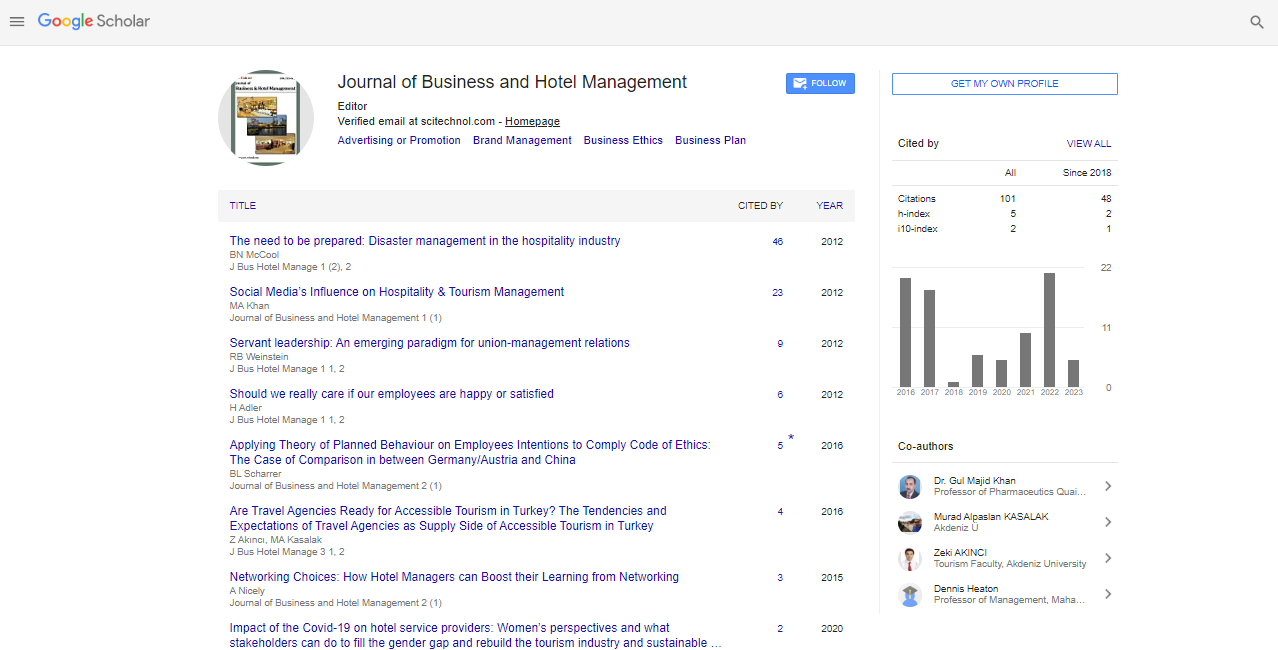Perspective, J Bhm Vol: 9 Issue: 1
Ethics and Leadership in Business
Yuniarti Gerard*
Department of Business Management, University of Valencia, Valencia, Spain
*Corresponding Author: Yuniarti Gerard
Department of Business Management, University of Valencia, Valencia, Spain
E-mail: yuniager@edu.es
Received date: 03 February, 2023, Manuscript No. JBHM-23-93146;
Editor assigned date: 07 February, 2023, PreQC No. JBHM-23-93146 (PQ);
Reviewed date: 21 February, 2023, QC No. JBHM-23-93146;
Revised date: 28 February, 2023, Manuscript No. JBHM-23-93146 (R);
Published date: 07 March, 2023, DOI: 10.4172/2324-9129.9.1.129
Citation: Gerard Y (2023) Ethics and Leadership in Business. J BHM 9:1.
Description
Ethics and leadership are two concepts that are intimately intertwined in the world of business. Leaders who are able to embody ethical principles and values are more likely to inspire trust, loyalty, and respect among their employees and customers, and to provide sustainable long-term success for their organizations.
Ethical Leadership
Ethical leadership refers to the ability of leaders to make decisions and take actions that are guided by ethical principles and values. Ethical leaders are committed to integrity, honesty, fairness, and respect, and they hold themselves and others accountable to these standards. They understand that ethical behavior is not only the right thing to do, but it is also good for business, as it can enhance reputation, build trust, and improve performance.
Importance of Ethical Leadership
Ethical leadership is essential in the business world because it sets the tone for organizational culture and values. When leaders prioritize ethics and integrity, they create a culture where employees feel valued, respected, and motivated to do their best work. Ethical leaders also promote transparency and accountability, which are essential for building trust with customers and stakeholders. Moreover, ethical leadership helps to minimize the risk of legal and reputational damage that can result from unethical behavior.
Leadership Challenges and Ethical Dilemmas
Leadership is not without its challenges, and ethical dilemmas are one of the most complex issues that leaders face. Ethical dilemmas arise when there are conflicting values or principles at stake and leaders must make difficult choices that can have significant consequences. For example, a leader might have to choose between maximizing profits and protecting the environment, or between honoring contractual obligations and treating employees fairly.
In these situations, ethical leaders must be able to balance competing interests and make decisions that are consistent with their values and the values of the organization. This requires not only a deep understanding of ethical principles, but also strong decisionmaking skills, emotional intelligence, and the ability to communicate effectively with stakeholders.
Building an Ethical Culture
Creating an ethical culture is a long-term process that requires the active engagement of leaders and employees at all levels of the organization. Ethical leaders can foster an ethical culture by modeling ethical behavior, communicating values and expectations clearly, and providing training and resources for employees to learn and apply ethical principles in their work. They can also establish systems of accountability and transparency, such as codes of conduct, compliance programs, and ethical hotlines, to ensure that ethical standards are upheld.
Conclusion
The intersection of ethics and leadership is a crucial component of organizational success in the business world. Ethical leadership helps to create a culture of integrity, transparency, and accountability, which can enhance reputation, build trust, and improve performance. While ethical dilemmas and challenges are inevitable, ethical leaders are able to navigate these complexities by balancing competing interests and making decisions that are guided by ethical principles and values. By building an ethical culture, leaders can ensure that their organizations are not only successful, but also contribute to the greater good of society.
 Spanish
Spanish  Chinese
Chinese  Russian
Russian  German
German  French
French  Japanese
Japanese  Portuguese
Portuguese  Hindi
Hindi 